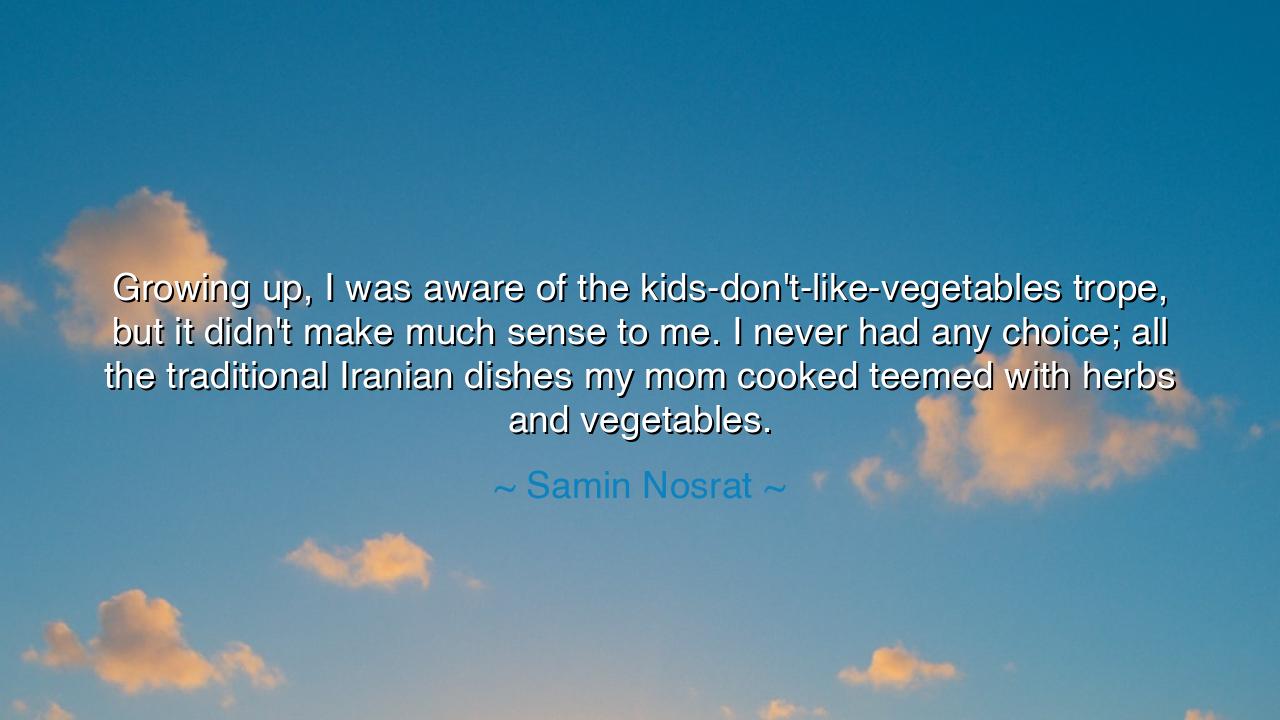
Growing up, I was aware of the kids-don't-like-vegetables trope
Growing up, I was aware of the kids-don't-like-vegetables trope, but it didn't make much sense to me. I never had any choice; all the traditional Iranian dishes my mom cooked teemed with herbs and vegetables.






Samin Nosrat once shared with clarity and tenderness: “Growing up, I was aware of the kids-don’t-like-vegetables trope, but it didn’t make much sense to me. I never had any choice; all the traditional Iranian dishes my mom cooked teemed with herbs and vegetables.” In these words lies a revelation of culture, of nourishment, and of the shaping power of tradition. She reminds us that what we love or resist is often not a matter of nature, but of upbringing—of what our mothers place before us, of what flavors we come to know as life itself.
The trope of children disliking vegetables is a tale rooted in Western culture, repeated so often that it becomes myth. Bitter greens, plain peas, carrots boiled without care—these became symbols of resistance at the dinner table. Yet Samin, raised in the rich tapestry of Iranian cuisine, knew no such rebellion. To her, herbs and vegetables were not punishment, but the very essence of flavor, color, and health. The difference was not in the children, but in the culture, in the way food was woven with love and tradition.
Consider the Persian table, where sabzi—fresh bundles of basil, mint, tarragon, and parsley—are placed alongside bread and cheese as daily companions. Where dishes like ghormeh sabzi, stewed with greens and beans, bring depth and fragrance to the home. In such a world, vegetables are not hidden or disguised; they are celebrated, exalted, made glorious. Samin’s mother, through her cooking, offered a heritage in which plants were not enemies of children’s palates but the lifeblood of family meals.
History, too, testifies to the shaping force of tradition in diet. The ancient Greeks praised their simple meals of olives, figs, and greens, believing them to strengthen both body and spirit. Hippocrates himself, father of medicine, declared, “Let food be thy medicine and medicine be thy food.” For him, the abundance of the earth’s plants was not to be resisted but revered. So too, Samin’s childhood echoes that timeless wisdom: that what is prepared with reverence becomes what sustains both flesh and soul.
The meaning of her reflection is this: our relationship with food, and by extension with life, is not predetermined but cultivated. The so-called trope that children despise vegetables is not truth but tradition, not biology but culture. Change the way food is offered, and you change the way life is perceived. Through her mother’s cooking, Samin was taught to embrace what others resisted, to see bounty where others saw burden. This is the power of inheritance, of roots, of the family table.
The lesson for us is clear: we must not blindly inherit the tropes of our society, whether about food, or work, or love. Question them. Ask whether they serve truth or merely repeat habit. Let us instead embrace the traditions that nourish us, that connect us to our heritage, and that bring joy rather than resentment. If we raise children to see food as celebration, they will carry that spirit into all areas of their lives.
Practically, this means rethinking the meals we make, the lessons we pass on. Cook with herbs and freshness, not just salt and fat. Share the table with stories, with gratitude, with the richness of culture. And in all areas of life, do not accept a trope as fate—seek instead the wisdom of those who came before, and weave that wisdom into your own path.
Thus, Samin Nosrat’s words, though simple, rise like a hymn: to mothers who teach through cooking, to cultures that exalt the gifts of the earth, to children who learn not rejection but delight. May we too learn from her example, and transform the sad tropes of our world into new traditions of joy, rooted in abundance and love.






AAdministratorAdministrator
Welcome, honored guests. Please leave a comment, we will respond soon